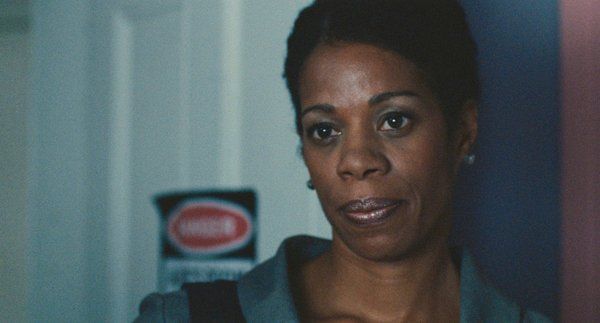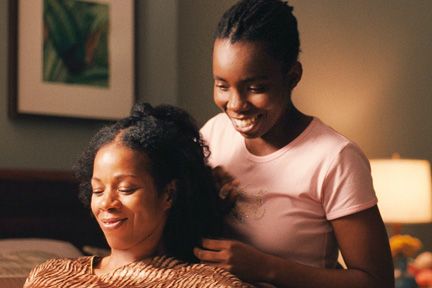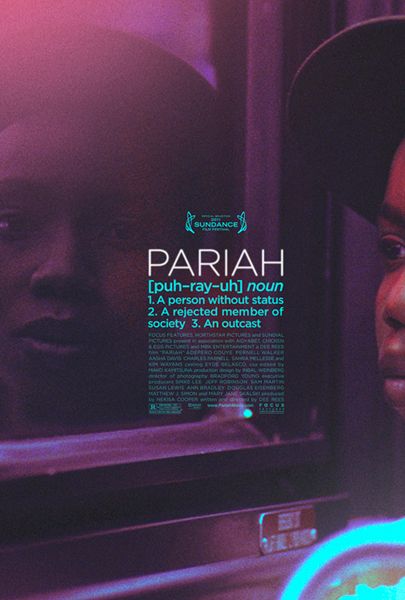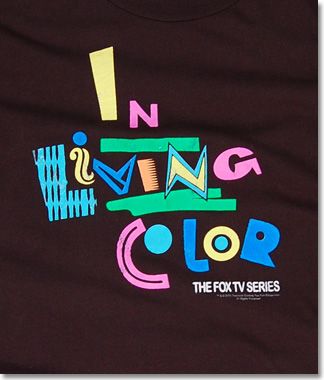In the indie drama Pariah, opening in limited release on December 28th, actress Kim Wayans takes her first heavily dramatic turn as Audrey, the mother of 17-year-old Alike (Adepero Oduye), a young woman learning to fully embrace her identity as a lesbian, with her mother’s obvious disapproval. Audrey is a very domineering presence who loves her daughter, but also wants to control every aspect of her life. She’s a desperate mother, struggling to save a daughter that doesn’t need saving, and who would just prefer to have support for who she already is.
At the film’s press day, Kim Wayans talked about the desire she’s had to do dramatic work, making the less obvious choices with her performance, being moved by the beauty and power of the story, that she hopes the film will be received with love and acceptance, and how the greatest reward from her involvement with the film has been having people come up to them to tell them how the film has affected their lives or transformed them, in some way. She also talked about how she will not be a part of the cast for the return of In Living Color but that she would love to make a cameo, if asked, and that she is currently shopping a comedy pilot, called Growing Up Wayans, to networks. Check out what she had to say after the jump:
Question: How did you prepare to play the mother of this child?
KIM WAYANS: Well, I read the script, over and over and over again, ‘cause you look for facts and clues about this person’s life, so that you can step into her shoes and see the world through her eyes. So, part of my process was just reading it, getting as many facts as I could, and trying to put together a psychological profile of who this woman was. If I had questions about certain things with her background, I’d talk to the director, Dee [Rees], and she would fill in the blanks for me. And then, you just live with it. You just live in that world until the character starts to take root and manifest.
What was your path to this role? Was it difficult to get people to think of you for something this dark and serious?
WAYANS: They weren’t thinking of me, at all. I’d been wanting to do dramatic work for awhile, and I’ve been studying with a really wonderful acting teacher, Diana Castle. So, I knew that I could do this, but the doors in Hollywood have basically been closed to me, in terms of dramatic acting. I can’t even get in the room to read. So, when this project came along, I was very fortunate that my manager had an in. She was friends with the casting director, so she begged the casting director to see me. And then, the casting director spoke to Dee and Nekisa [Cooper], the director and producer. They had seen almost every actress in town, at that point. They were about to rewrite the role because they felt like nobody was really getting what they wanted. Dee said she kept getting one black, angry momma after the other, and that’s not really what she was looking for. She wanted somebody to bring Audrey’s vulnerability to the surface. So, they were like, “Well, Kim Wayans wants to read. Let’s see what she can do.” I went in and read, and I got it.
Why do you think everyone else was going in and playing the role angry? Was this all happening post-Precious?
WAYANS: No, I don’t think it was about that, at all. I just think that, if you take the literal Audrey off the page and you don’t really understand that at her core is love, then that’s what you play. You play the anger. You play the angry mother who doesn’t like what’s going on. It’s the natural choice. But, what gets you the job is making the unnatural choice, to go deeper and to understand what’s really, really, really going on with this woman – her fear, her love and what’s really going on with her. That was the obvious choice, and I made a choice that wasn’t so obvious.
Do you think your comedy background helped, since so much of getting the job in comedy is going the unnatural route that other comedic actors aren’t?
WAYANS: It’s possible. I never thought of it that way, but it’s totally possible. I think my comedic training has helped me and served me, in a lot of ways with this. In particular, what it’s done is give me a certain kind of fearlessness, so I’m not afraid to bare it all. It’s wacky and crazy when I’m baring it all and acting ridiculous as some kind of character, but it’s that same art to bare it all and go to those places that you need to go and not think about anything else except focusing on telling this story and getting this job done.
How would you describe this mother-daughter relationship?
WAYANS: Well, Audrey is a very controlling figure. She wants to keep her daughter right here. She’s one of those moms that doesn’t want to let the birdie fly, so she’s a very domineering presence in her daughter’s life. She loves her daughter, very much, and she wants to control her. She thinks that she knows what’s best, and based on what she’s been taught and the doctrine that she believes in, what her daughter is doing is about to destroy her life. So, you have a desperate mother, struggling to save her child.
How were you able to connect with Audrey?
WAYANS: When I read the script, I was just moved. I was moved by the entire project. It was so beautiful, so powerful and so relevant, given all that’s been going on with kids committing suicide because they don’t have a safe place to go. And, she just broke my heart. I didn’t see her as a monster or a villain. I saw her as being just as much a victim as everybody else. She’s a victim of what she believes, her belief system and the things that tell her that her daughter’s lifestyle choice is wrong. She was just so sad, so lonely and so disconnected from everybody that I just had a lot of compassion and a lot of empathy for her. Once I approached it from a place of a mother fighting to save her child, I was really able to hook into that. Even though I don’t have children, I have 38 nieces and nephews, and I love them all. They didn’t come through me, but they are mine. So, I felt like I really understood what that is. And then, I had such an amazing mother, who had to struggle to raise us all, with the little bit that she and my dad had. So, I saw that mother love. I saw that fight. I was able to connect into that, as well.
When you do comedy, you want to hear that laugh. In doing a dramatic role, was it an adjustment for you, as an actor, to not hear laughter?
WAYANS: No, you’re just in it. You’re so focused on telling this story, and this is not a comedic story. All those expectations just fall away. You’re just there, doing what you need to do to express this particular story, so it doesn’t really come into play. A lot of the comedic work I’ve done has been over-the-top, sketchy stuff. It’s not really rooted in reality, per se. But, when you’re doing something like this, it has to totally be rooted in reality. You’re not going to hear things from the director like, “Bigger! More energy!” Those are the things you hear, as a comedienne. So, all that falls away and it’s just the truth of what’s happening, in this moment, with you and the person you’re dealing with right now.
What was going on between Audrey and Arthur (Charles Parnell), and their marriage?
WAYANS: It’s a very strained relationship. There’s a backstory that you don’t know, where I was supposed to finish school, and then he was supposed to finish school. He wanted to be a doctor, but things didn’t work out that way. I had children, and he would have preferred to have put the children on ice and do what it was he wanted to do, career wise. But, he wasn’t able to do that, so there was this simmering resentment toward me, like I took something from him. That was one of the issues in the relationship. And, he was cheating.
Audrey is a very strict, Christian mother, and homosexuality is a hot topic for African Americans in the Christian community. How do you hope the black Christian community receives this movie and your role?
WAYANS: I hope that they’ll receive it with love and with acceptance. I hope that it will open eyes for people. I hope it will create dialogue. I hope that people take the message from it, of acceptance and of loving people for who they are, and not trying to impose your value system or your judgements on anybody, but just love and accept.
As someone who is obviously an open-minded person, how tough was that scene at the end, when your daughter comes to your work and says that she loves you, but you still turn her away?
WAYANS: It was heartbreaking. It was heartbreaking for Audrey, and it was heartbreaking for Kim, to have to be in that space where you could actually give your child up for anything. A mother’s love is supposed to be unconditional. That you could give your child up, over their sexuality, is unthinkable. It really, really just broke my heart, to have to inhabit that space where she’s opposite me, trying to reach out and I’m just like, “I can’t do it.” It’s heartbreaking.
What did you think of the character of Alike, after you saw the film?
WAYANS: Oh god, I was just blown away. She’s such a beautiful spirit and such a wonderful, talented actress. I was just so moved by her performance. She’s just a very, very special person. She’s a beautiful person, inside and out.
What was Dee Rees like, as a director, and how was the atmosphere on set, for this kind of subject matter?
WAYANS: It was wonderful. Dee and Nekisa did such a good job of creating an environment where we all felt safe, and we all felt like we could go to those dark places and we would be protected. There was no reason to be fearful. They had all kinds of behind-the-scenes things going on, that I learned about, after the fact, like not having enough money to continue the next day, but she never let on that any of that was going on. The set was always very peaceful and very creative. While a lot of the stuff that we had to live in was dark stuff with dark emotions and things that had to be expressed, the set itself was just amazingly light and loving. We were all so happy to be there, and all so passionate about this project and getting it done, that it really was a very, very amazing experience. And Dee, as a director, is awesome because she knows exactly what she wants. She makes your job easy because she’s so specific with what it is that she wants. And, she’s the type of director that will let you bring what you worked on to the table, and let you do it. She’ll do one take where you do whatever it is you’ve prepared, and then, if she’s not fully satisfied, she’ll come and she’ll just make a slight adjustment, and you’ll do it again. She’s very quiet, the way she works. She doesn’t put you on blast, in front of everybody. She’s not like, “I didn’t believe that!” She just comes over and gently talks to you, and it’s cool. She knows exactly what she wants.
What do you hope the audience takes away from this film?
WAYANS: I hope they take away the fact that we should accept and we should love. We shouldn’t judge people. We should understand that people come into this world the way they are. Homosexuality is not a choice. It’s how people are drawn. That’s who they are. Our concern should be on people having good hearts and being good people and doing good work in the world, and not focus on what their choice is, sexually or otherwise. That has nothing to do with anything.
This movie has already gotten some accolades. What are your hopes for the upcoming awards season?
WAYANS: Awards are great. They’re really, really wonderful. It’s the affirmation of all your hard work, and the fact that people received it well, so I’m not going to knock awards. They’re wonderful. But, I will say that the greatest reward is having people come up to us, after seeing the film, and telling us how this film has affected their life or has, in some small way, transformed them. I had a woman stand up at one of our screenings in D.C., after the movie, and she had a real heaviness about her. You could tell that she was kind of beat down. She stood up and she said, “I want to thank you guys ‘cause this movie taught me that I have to go home and love my child, no matter what.” There wasn’t a dry eye, on the stage. Really, that’s what it’s all about. This movie has the power to do that and to hold up a mirror for people who are in these kinds of situations, and make them want to go home and have a dialogue and embrace their children. Wow! I don’t know what shelf I’d put that award on.
In light of all the success that female directors are getting, would you consider doing your own directing, at any point?
WAYANS: Sure, I would consider it. Actually, I have a comedy movie that I wrote, that I’ve thought about directing myself, from time to time. And, I did some directing on My Wife and Kids. I directed several episodes of that show. So, yeah, I think I have it in me and I think that, eventually, that will be something that I manifest.
In the future, do you think you’ll be doing more comedy or drama?
WAYANS: It’s my hope that I will be able to move between both worlds. I love comedy, I love drama, and I love telling good stories. I hope that this is the beginning of something new and wonderful. I’m not giving up comedy, but I’d like to move in both worlds, like Robin Williams does and Whoopi [Goldberg] does.
What’s your family’s response, in seeing you in this role? Did they know you had this in you, or were they surprised?
WAYANS: Yeah, they’re not surprised. They knew I had it in me. They’re just very, very proud, and they loved the movie. We screened it for them, and they were just so moved by it. They just think it’s a beautiful film that people really need to keep out and see. They were very proud of me.
Have your family members also had the same challenges, trying to break out into drama?
WAYANS: Marlon has already done Requiem for a Dream, and he was wonderful in that. So he, of all my brothers, would love to do more dramatic work. And Damon is a really good dramatic actor, as well. But, I know, just from conversations with Marlon, that it is something that he would like to do. Actually, if they ever find the funding, he will be doing the Richard Pryor movie.
With In Living Color coming back, are you going to be involved in that, at all?
WAYANS: No. It’s going to be a fresh, new cast. If Keenan [Ivory Wayans] asked me to do a cameo or something, I’d blow the dust off my curlers and get back in that window. But, this is an opportunity for the young, upcoming comedians who don’t really have a place that they can springboard out of. It will hopefully do, for a new generation, what In Living Color did for so many of us.
Do you have any upcoming projects?
WAYANS: Yeah, I have a pilot that I co-wrote with my husband, that my brothers executive produced, and it’s called Growing Up Wayans. It’s inspired by our childhood, and I play the mom of a brood of six children that we’re raising, in the New York City housing development. It’s just a show about family and about struggling. It’s about this mother who, despite the little means that they have, is determined that her kids are going to be successful. It’s just about the journey of what it was like to grow up Wayans. There’s a lot of comedy and a lot of good times, and I think it’s a show that will resonate with a lot of people because struggle is a part of life. There are 48 million Americans are living below the poverty line, and yet you look at the television landscape and you think that everybody is upper-middle class or wealthy. So, this is a show that will really resonate with a lot of folks. We’re shopping it around now, trying to get it set up at one of the networks.




